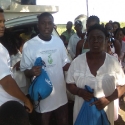
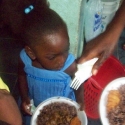
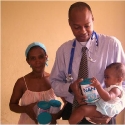
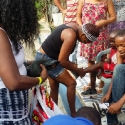

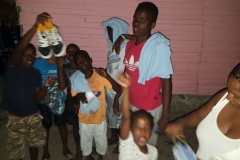
Throughout our various campaigns, such as the Mother’s Back-to-School, Haitians Helping Haitians and now through the Pay It Forward Campaign, our donors have been the “fuel to our engine”. Our activities include the provisions of:
At CRE, we believe that all people in the world are blessed with a gift despite the path they’ve chosen or their financial situation. The gift we all receive, whether it be monetary or other, is a good turn that ought to be repaid by having it done to others. The donations we receive during this campaign are given to individuals in dire need. Conversely, for every donation given to a family or an individual, we ask of them to pay that kindness forward to another individual or family…not necessarily in monetary ways, but by simply by doing a good deeds towards others. Such good deeds should be things that the other person cannot accomplish on their own. In this way, the need to help one another can spread exponentially through society, creating a social movement with the goal of making the world a better place.
Cash. Simply put, we need monetary funding to carry out most of our activities, particularly when goods are provided to people overseas.
Donations may be made by check or money order to: The Center for Research and Education P.O. Box 1685 North Baldwin, N.Y. 11510 Please make all checks payable to: The Center for Research and Education. Your donations are greatly appreciated!
Food – After consulting with local experts, a culturally sensitive choice of food items are provided to families and individuals. The selection, quality and quantity of food provided depend on the donations we receive to feed people of a given region. Our goal is to eradicate hunger and malnutrition one group at a time.
Clothing – Gently used or new summer clothing is best for the population we serve. Donations of clothing are provided to people of all ages and sizes. Disposible diapers and pull-ups for children prevent worms and other bacteria.
First Aid Supplies – It is unbelievable how much a box of gauze, and a bottle of rubbing alcohol could cost a family in the developing world to purchase. In many countries a family could eat a hot meal for the same cost of basic first aid supplies and the cost of seeing a physician is not affordable. Cuts and wounds often go unattended and lead to serious infections. We provide first aid kits with topical antibiotic ointment, alcohol or hydrogen peroxide and bandages to help prevent bacteria born infections.
Educational Supplies – Notebooks, pencils, pens, erasers go a long way to help parents send their children to school in the developing world. These items, uniforms and a breakfast bowl of porridge is primarily what is needed daily to help children of all ages to obtain an education. Your donation of these items or money to pay for nominal school fees could help an entire family, village or town create another law-abiding, educated and productive citizen.
Passenger Vehicles – Whether your vehicle is a late model sedan, a classic collectable, an unfinished project car or an old hoopdie gathering dust in the driveway, CRE will turn any vehicle into a valuable donation to help a family in need. We accept donations of passenger vehicles including:
It is important to note that the Center for Research & Education is not yet a 501 (c) (3) charitable organization, therefore the donation of your vehicle will not be considered tax deductible. Also note that a social security number is not required if your vehicle is sold to CRE for less than $500.
You can expect a receipt from us within 30 days from the time we pick up your vehicle. Title is required.
Fixed and Shipped – If a vehicle is in mint or better condition or can be fixed by our mechanic(s), it is shipped to a large family in the developing world for transport or for taxi registration. Our primary goal is to provide the head of household with a means to earn a living and so as to lessen dependency on charity. Please bear in mind that Tractors, Trucks, Farm equipment and motorcycles also provide lucrative means of employment in the developing world.
Vehicle auctions is the most profitable, efficient and cost effective way to liquidate donated vehicles. These auctions expose your vehicles to the greatest number of buyers which maximizes the sale price of each vehicle. Those proceeds go to help poor families in the developing world.
Used Car Dealerships – Many donors provide late model vehicles that are excellent candidates for resale at used car dealerships.
Recycled – Some vehicles will cost more to transport than they are likely to sell for. This can happen when the vehicle is in exceptionally poor condition, when the donor is in a remote location or when market conditions are not favorable for donated vehicles. These vehicles will be sold to recyclers to incur monetary value.
CRE will proudly donate an average of nearly 50% of vehicle proceeds to the poor. Remaining monies will pay for shipping and handling of vehicles.